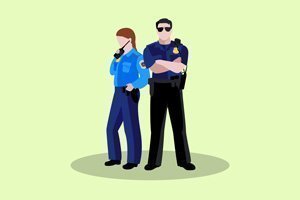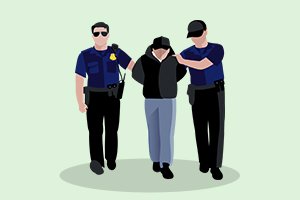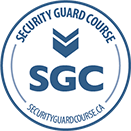What is the PSISA?
The PSISA is an acronym for The Private Security and Investigative Services Act, 2005.
The PSISA regulates the security industry. As such, security guards must be familiar with the PSISA to ensure they follow the regulations and prohibitions, including the Code of Conduct.
Here are some of the key points that affect individual licensees directly.
Licensing Requirements
In order to be eligible for a security guard licence, all individuals must:
- Have completed the required training and/or testing.
- Be at least 18 years old.
- Possess a clean criminal record, according to the Clean Criminal Record Regulation (note: not all criminal charges or convictions will prevent a person from obtaining a security guard licence. See below for more information on the Clean Criminal Record Regulation).
- Be legally entitled to work in Canada.
People who apply for a security guard licence will be required to show proof that they meet all of these requirements. If they are not eligible for a security guard licence, their application will not be processed. For more information about the identification requirements consult the ministry website.
General Rules and Standards of Practice
These are some of the rules that security guards must be mindful of during their day-to-day activities. They can be found between sections 35 and 40 of the PSISA.
- Security guards must always carry their licence with them when they are working (including “plain-clothes” security guards, e.g. loss prevention personnel or bodyguards). They must also identify themselves as security guards, and show their licence, if a member of the public asks them to do so.
- With the exception of bodyguards and loss prevention personnel, security guards must wear a uniform while working. See below for further information on the Uniforms Regulation.
- Security guards are prohibited from carrying any symbol of authority, other than their licence and uniform (for example, a metal badge is prohibited).
- Security guards are prohibited from holding themselves out as police officers, or performing police-related duties. For this reason, they are also prohibited from using the following words when referring to their work as security guards:
- Detective or Private Detective
- Law Enforcement
- Police
- Officer
For example, security guards are prohibited from referring to themselves as “security officers”.
Regulations
In addition to the PSISA, there are several regulations which govern security guards. Many of these regulations apply only to employers. However, individual licensees should be familiar with the regulations, particularly those that affect them directly:
Code of Conduct
This regulation defines what kind of behavior is appropriate or inappropriate for security guards to display while they are working. Security guards will find that respecting the Code of Conduct is, in most cases, a matter of common sense – security guards are expected to treat members of the public in a respectful and professional manner. For instance, security guards must:
- Act with honesty and integrity
- Comply with all federal, provincial and municipal laws
- Treat all persons equally (without discrimination)
- Avoid using profanity or abusive language
- Avoid using excessive force
- Not be under the influence of alcohol or drugs while on duty.
Uniforms
With the exception of bodyguards and loss prevention personnel, all security guards must wear a uniform that complies with the Uniforms Regulation. If a guard works for a licensed security agency, his or her employer is responsible for ensuring that the uniform meets all the requirements. Please note, security guards must also be familiar with the regulation, as it is their responsibility to wear the proper uniform on a daily basis. Some key points to look out for:
- The term “SECURITY” or “SECURITY GUARD” must be displayed on the uniform in specific places and specific dimensions.
- The uniform must include an identification tag, which shows the licensee’s name, or licence number or both.
- A security guard uniform should not bear any traits that resemble a police uniform, such as rank chevrons, a police-style forage cap, or stripes down the side of the trousers.
Eligibility to Hold a Licence – Clean Criminal Record
This regulation lists a series of criminal offences which are prescribed under the PSISA. Persons who have been convicted of any of these offences and have not received a pardon are not eligible for a security guard licence, and any application they submit cannot be processed.
Persons who have been convicted of or charged with an offence that does not appear in this regulation may be eligible for a licence. The Private Security and Investigative Services Branch (PSISB) will need to review their file to determine if any restrictions should apply. The applicant may be given an opportunity to be heard in order to discuss their case.
Public Complaints
Members of the public may file a public complaint against any licensed individual or licensed company if they feel that a violation of the PSISA or its regulations has been committed.
Public complaints can lead to facilitation. As well, the PSISB may investigate the matter and as a result, charges may be laid against the licensee, a warning may be issued, or the licence may be revoked.
Penalties for Contravening the Act
Individuals found guilty of offences under the PSISA could face a fine of up to $25,000, imprisonment for up to one year or both. As such, it is crucial that security guards comply with all aspects of the PSISA and its regulations to avoid the possibility of being named in a complaint or facing charges.








